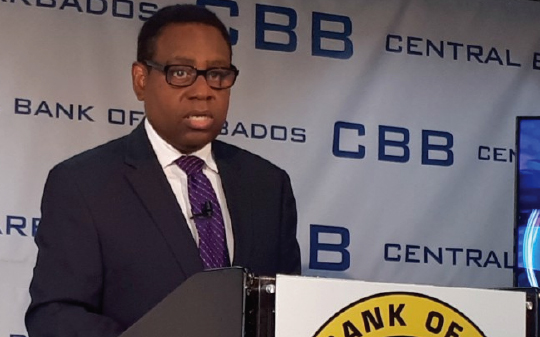Governor of the Central Bank Cleviston Haynes is urging businesses to hold strain on prices as consumers continue to struggle financially due to the impact of the COVID-19 pandemic.
At the same time, he is calling on financial institutions and their customers to continue to work out solutions for debt payment.
Over the past six months, there has been a reduction in the amount of money Government has paid for imported goods – $2.1 billion at the end of September, compared to $2.14 billion for the same period last year. This was mainly due to the $395.7 million in fuel imports, compared to the $534.5 million for that commodity the same period last year.
While residents were generally paying less for some commodities, including clothing and footwear, as a result of lower inflation, there have been complaints about rising food and real estate prices in recent times.
Haynes said he was aware of the complaints, but quickly pointed out that there were several factors that could easily impact food prices.
“One is what is happening to import prices. Firms will need to recover on import prices. If they go up, that is a factor they have to take account of.
Then there is the mark-up, so what one would really want is that firms not seek to raise their mark-ups during this difficult period,” said Haynes, who pointed out that Barbados generally has high import taxes.
Adding that increasing prices was not in the best interest of businesses, he pointed out that some households were still struggling because of diminished income and were simply unable to buy like they did before the pandemic.
“In some cases, you may actually have to reduce your mark-ups,” said Haynes, who acknowledged that since the easing of restrictions several retailers have been offering deals on a range of items.
Stating that commodity prices were now relatively stable on the international market, Haynes said he saw no reason for prices to increase at this point, given that most of what was consumed locally was imported.
At the same time, he cautioned that prices on agricultural products remained volatile and they would depend on supply and demand.
“At this time, I would not get too alarmed about price increases,”said Haynes.
“But I would want to encourage businesses not to raise their mark-ups during this difficult period.”
In relation to real estate prices, some residents have raised concerns that the recently introduced 12-month Barbados Welcome Stamp initiative was already resulting in higher prices for locals.
While reasoning that the law of demand and supply could very well be playing a role, Haynes pointed out that in recent years, real estate prices have fallen.
He also noted that there was still a “fair amount of unused capacity” in the real estate market and prices should not rise significantly, if they did go up.
“If there is no demand you will find the prices coming down. If the Welcome Stamp takes up a substantial proportion of the unused capacity . . . then there is that possibility that it will raise prices,” the Central Bank Governor explained.
“A lot would depend on how substantial a share of the excess capacity in the market is being absorbed by the Welcome Stamp programme. So we have to wait and see how those numbers will evolve.”He also explained that there was the possibility of price discrimination, where “you are able to apply different prices to different segments of the market”.
In relation to debt payments, Haynes said there was no cause for concern at this point, but said it was a situation that should be carefully monitored.
“What has happened over the six months is that financial institutions have been working with their clients and the amount of debt that has been deferred is falling, and I anticipate more of it will fall in the coming months as persons are able to work solutions out,” said Haynes as he delivered his quarter economic review recently.
“The key thing here is that individuals need to work with the banks and banks need to work with individuals to find solutions to work out the debt that they have,” he added, as he recommended longer payment periods and debt consolidation where applicable.
The largest percentage – about 58 per cent – of household debt is mortgages, followed by consumer loans and credit card debt.




